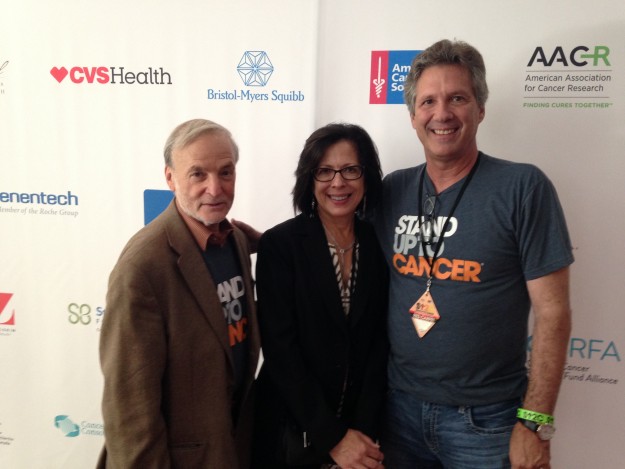Johns Hopkins Kimmel Cancer Center researchers and clinicians are among the leaders of one of the 10 Stand Up To Cancer (SU2C) Catalyst® clinical trial projects. Researchers from more than 30 institutions are collaborating across academic and corporate borders on clinical trials aimed at understanding why treatments are effective—across a variety of cancers—in a program supported by industry. The inaugural SU2C Catalyst projects will explore new uses for an array of powerful medicines, from three SU2C Catalyst Charter Supporters and six other pharmaceutical companies.
Johns Hopkins Kimmel Cancer Center epigenetics expert Stephen Baylin, M.D., is a co-leader of a project with Michael Hellmann, M.D., from Memorial Sloan Kettering Cancer Center. The focus of the collaboration is a clinical trial combining two epigenetic drugs with immunotherapy for patients with non-small-cell lung cancer. Lung cancer experts Jarushka Naidoo, M.B.B.Ch., also from Kimmel Cancer Center, will oversee the trial at Johns Hopkins. The clinical trial comprises work from the Van Andel Research Institute (VARI)–SU2C team co-lead by Baylin and Peter Jones, Ph.D., VARI scientific director.
Epigenetics is the term for cancer-promoting alterations to our genes that occur without permanently marking the DNA of cells like mutations do. In epigenetics, changes in chemical marks on DNA and loosening or tightening of the way DNA is packaged in the nucleus of the cell cause genes to be turned on and off. Cancer corrupts this normal cellular function to allow cancers to begin, grow and spread.
The SU2C-supported clinical trial is based largely on the soon-to-be published laboratory research of Kimmel Cancer Center graduate student Michael Topper and research associate Michelle Vaz. It will use two drugs, guadecitabine and mocetinostat, to block both kinds of epigenetic alterations in combination with pembrolizumab, an immunotherapy that tears down a shield that cancer cells use to hide from the immune system.
“We hope this combined treatment will expand the benefit of immunotherapy to more non-small-cell-lung cancer patients,” says Baylin, the Virginia and D.K. Ludwig Professor of Oncology and Medicine, Co-Director of the Kimmel Cancer Center’s Cancer Biology Division and Associate Director for Research Programs.
The Johns Hopkins Kimmel Cancer’s Greenberg Bladder Cancer Institute is also a site for a Van Andel Research Institute–Stand Up To Cancer Epigenetics Dream Team
bladder cancer trial that will investigate whether epigenetic drugs can reverse resistance to immunotherapy, a problem that approximately 85 percent of patients with the disease face. Noah Hahn, M.D., is leading the trial at the Kimmel Cancer Center.
Currently, about 20 percent of patients get long lasting control of their lung cancer with immunotherapy alone, but Baylin, Hellmann and team think they may be able to increase the number of patients who respond by adding epigenetic-targeted treatments. “This clinical trial will tell us if epigenetic therapy can make immunotherapy work better in these patients who do not get results from immunotherapy up front.”
Read the full announcement and an announcement from the Van Andel Research Institute. Learn more about other SU2C-supported cancer clinical trials at StandUpToCancer.org and aacr.org.
